Are Maine Coon Cats Hypoallergenic – Things You Need to Know
Are Maine Coon cats hypoallergenic? Mainecoons, the unofficial state cat of Maine, are one of the largest domesticated breeds of cats. They are also rumored to be hypoallergenic. But what does that mean for people with allergies? And are there any other benefits to owning a maine coon? In this post, we’ll explore these questions and more. So if you’re considering adding a maine coon to your family, read on! You might just find that these big kitties are the perfect fit for you.
Maine Coon Cats – About the Breed
Maine Coon cats are one of the largest domesticated cat breeds, with a distinctive physical appearance and valuable hunting skills. They are also known for their intelligence, playful personality, and companionship.
The Maine Coon is a native American breed that was first discovered in the state of Maine. These cats are known for their large size, long hair, and bushy tails. They are also known for their hunting skills, as they are able to catch rodents and other small animals.
The Maine Coon is a popular breed of cat, and they are often used as pets or show cats. They are also sometimes used as working cats, such as in barns or stables.
If you are thinking about getting a Maine Coon, it is important to research the breed and find a reputable breeder. This will help you to get a healthy kitten or cat that has been properly socialized and cared for.
Maine Coon cats are typically healthy and long-lived, but there are some health problems that can affect them. These include hip dysplasia, cardiomyopathy, and polycystic kidney disease.
Maine Coon cats are generally good with children and other pets, but they may be shy around strangers. They are also known to be independent and sometimes stubborn.
If you are looking for a loyal and loving companion, the Maine Coon may be the right cat for you. These cats make great family pets and can provide years of companionship.
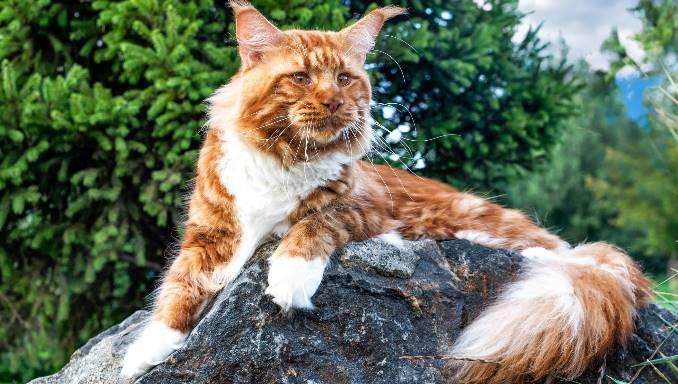
Are Maine Coon Cats Hypoallergenic?
Maine Coon cats are not considered to be hypoallergenic. However, they produce less of the Fel d 1 protein, which is responsible for triggering allergies in people, than other cats. If you’re allergic to cats but would still like to own one, a Maine coon might be a good choice for you.
There are a number of factors that can contribute to how allergic someone is to a particular cat. These include the amount of time spent with the cat, the type of fur, and the cat’s diet.
Some people may be able to tolerate Maine Coon cats better than other types of cats. If you are allergic to cats but are interested in owning one, it is important to spend time with a Maine Coon cat before making a commitment. This will help you to determine if you are able to tolerate the cat and if you have any adverse reactions.
How Do You Know if You Are Allergic to Maine Coon Cats?
There are a few ways to tell if you may be allergic to Maine Coon cats. One way is if you have allergy symptoms like sneezing, watery eyes, or a runny nose around them. Another way is if you have asthma and your asthma gets worse when you are around them. If you think you may be allergic to Maine Coon cats, it is important to see an allergist to get tested.
Are allergies to cats dangerous?
There is no definitive answer to this question, as everyone’s individual reaction to cat allergies can vary in severity. However, it is generally agreed that severe allergic reactions to cats can be dangerous, and even life-threatening in some cases. If you suspect that you may be allergic to cats, it is important to consult with a medical professional to determine the best course of action to take.
While there is no cure for cat allergies, there are ways to manage them and make them more manageable. For example, avoid close contact with cats, use air filters and purifiers in your home, and keep your cat well-groomed to reduce the amount of dander in their fur. If you do have an allergic reaction to a cat, be sure to seek medical help immediately. In severe cases, anaphylactic shock can occur, which can be life-threatening. With proper treatment, however, most people with cat allergies can safely and effectively manage their condition.
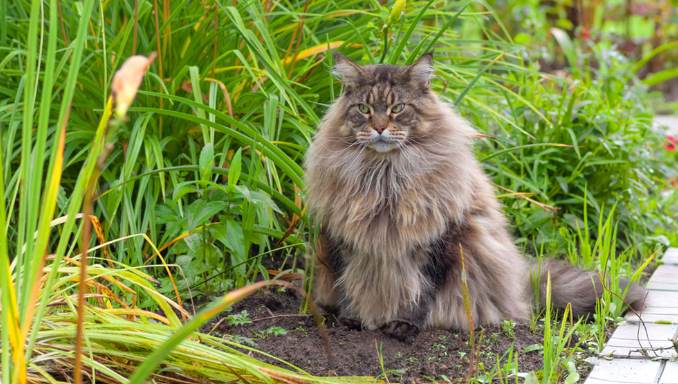
How to Reduce the Risk of Cat Allergies
There are a few things you can do to reduce the risk of cat allergies:
1. Choose a hypoallergenic breed. Some breeds, such as Siberian cats, produce less of the protein that causes allergies.
2. Get your cat tested for allergies. A simple blood test can tell you if your cat is allergic to anything.
3. Get your cat vaccinated against allergies. There are vaccinations available that can help reduce the risk of allergies.
4. Avoid triggers. If you know what triggers your allergies, try to avoid them. For example, if you’re allergic to cat fur, don’t let your cat sleep on your bed.
5. Use air filters. Air filters can help remove allergens from the air, making it easier to breathe.
6. Wash your hands after handling your cat. This will help remove any allergens that you may have come into contact with.
7. Consider allergy shots. If other methods don’t work, you may want to consider allergy shots. These can help reduce the severity of your allergies.
Tips to reduce the risk of being allergic to Maine Coon cats if you have one:
- Don’t let your cat lick your face. Allergic reactions can occur through contact with saliva, so it’s best to avoid letting your cat lick your face altogether. If you must, wash your face thoroughly afterwards.
- Keep your cat clean and well-groomed. Regular brushing will help remove any loose hair and dander that could cause an allergic reaction.
- Avoid using topical flea treatments on your cat. Many of these contain chemicals that can be irritating to people with allergies. If you must use a flea treatment, ask your vet for one that is safe for people with allergies.
- Consider getting an air purifier. This can help remove any allergens that might be floating around in the air, such as cat dander.
- Talk to your doctor about allergy shots. If you’re severe allergic to cats, these shots can help reduce your symptoms and make it possible to live with a Maine Coon cat.
Do Maine Coon Cat Shed?
Yes, the Maine Coon cat does shed. However, they are not considered a heavy shedding breed. They typically shed less than other breeds of cats. If you are considering getting a Maine Coon cat, be sure to ask the breeder about the shedding habits of the specific cat you are interested in. Some Maine Coon cats may shed more than others.
How to Groom a Maine Coon Cat
Maine Coon cats are medium to long haired cats. They do require regular grooming to prevent mats and tangles from forming in their fur. Grooming also helps to remove dead hair and distribute the natural oils throughout the coat. The best way to groom a Maine Coon cat is to use a metal comb with wide teeth. Start at the head and work your way down the body. Be sure to comb through the hair on the legs and tail. You may also need to use a slicker brush to remove mats and tangles. Grooming sessions should be done at least once a week, and more often if the cat is shedding heavily.
If you are not able to groom your Maine Coon cat at home, you can take them to a professional groomer. Be sure to find a groomer that is experienced with handling long haired cats. They should also be familiar with the Maine Coon breed specifically. This will help to ensure that your cat has a positive experience and does not come home traumatized or injured.
Maine Coon cats are one of the most popular cat breeds in the world. They are known for their large size, playful personalities, and beautiful coats. If you are considering getting a Maine Coon cat, be sure to do your research and find a reputable breeder. Grooming is an important part of owning a Maine Coon cat, and should be done on a regular basis. With proper care, your Maine Coon cat will be a beloved member of your family for many years to come.
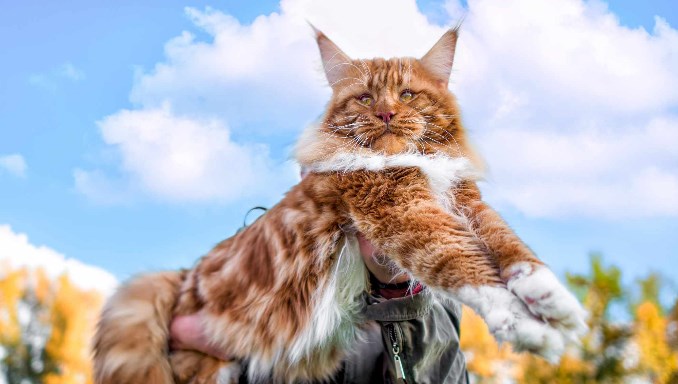
Other Things to Know before Raising a Maine Coon Cat
Maine Coon cats are a popular breed, but they’re not right for everyone. Here are a few things to keep in mind before you decide to get one:
1. Maine coon cats are one of the largest domesticated cat breeds. They can weigh up to 18 pounds and grow up to four feet long from nose to tail tip.
2. Maine coon cats are known for their gentle dispositions and loving nature. They make great companions and are often described as “dog-like” in their loyalty.
3. Maine Coon cats can be expensive. Depending on where you get your cat, they can cost anywhere from $500 to $2000.
4. Maine Coon cats require a lot of grooming. Their long fur needs to be brushed regularly to avoid mats and tangles.
5. Maine Coon cats are high-maintenance pets. They need a lot of care and attention, and they’re not the best choice for someone who’s not prepared to commit to that level of responsibility.
6. Maine Coon cats can be allergic to some people. If you’re allergic to cats, it’s important to get your cat tested for allergies before you bring them home.
7. Maine Coon cats are susceptible to certain health problems. Some of the most common health problems in Maine Coon cats include hip dysplasia, heart disease, and respiratory problems.
8. Maine coon cats are relatively slow to mature, taking up to four years to reach full size and weight. They also tend to live longer than most other cat breeds, with an average lifespan of 12-15 years.
Raising a Maine Coon cat can be a rewarding experience, but it’s important to do your research before you commit to one. These cats are high-maintenance pets that require a lot of time, effort, and money. If you’re not prepared for that, they may not be the right breed for you.
Pros and Cons Of Having a Maine Coon
Maine Coon cats are one of the most popular cat breeds, and for good reason! They are big, beautiful, and have unique personalities. But before you adopt a Maine Coon cat, it’s important to know both the pros and cons of this breed.
Pros:
-Maine Coon cats are very loving and affectionate. They enjoy being around people and will often follow their owners around the house.
-Maine Coon cats are also very intelligent and can be trained to do tricks or even walk on a leash.
-Unlike some other cat breeds, Maine Coons are not prone to obesity. This is because they have high metabolisms and love to play and run around.
-Maine Coons are very adaptable and can live happily in both small apartments and large houses.
Cons:
-Because of their size, Maine Coon cats can be quite a handful. They need plenty of space to run and play, and they can be destructive if left bored or alone for too long.
-Maine Coon cats also shed a lot. If you’re not a fan of cat hair, this may not be the breed for you!
-Maine Coons can be expensive. Because they are such a popular breed, Maine Coon kittens can cost upwards of $1000.
If you’re considering adopting a Maine Coon cat, be sure to do your research and weigh the pros and cons carefully. Maine Coons are wonderful pets, but they’re not right for everyone.
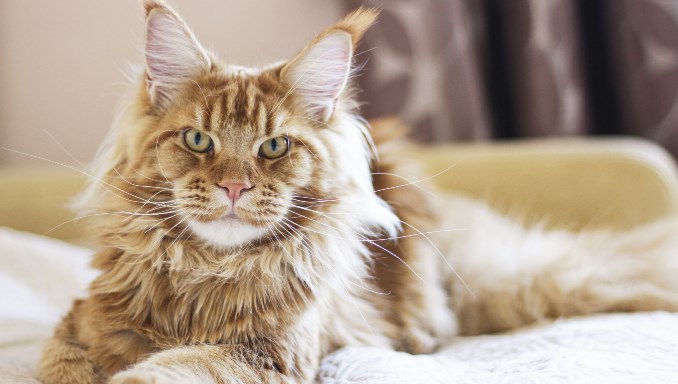
Diet of a Maine Coon Cat
Maine Coon cats are known for their large size, and they need a diet that will help them maintain their health and energy levels. A diet for a Maine Coon cat should be high in protein and fat, with moderate carbohydrates. Below is a list of some of the best foods for Maine Coon cats:
-Raw, canned, or freeze-dried chicken, turkey, fish, or beef
-Cooked egg whites
-Raw or cooked vegetables like broccoli, carrots, and sweet potatoes
-Canned pumpkin or squash
-Fats like tuna oil, olive oil, and coconut oil
Maine Coon cats should not eat any dry food, as it is not nutritionally complete and can cause health problems. If you’re not sure what to feed your Maine Coon cat, talk to your veterinarian for guidance.
Cost of Raising a Maine Coon Cat
Maine Coon cats are a popular breed, and they can be quite expensive. Kittens can cost upwards of $1000, and adults can cost even more. The cost of raising a Maine Coon cat also includes the cost of food, litter, toys, and vet care. Below is a breakdown of the typical costs of raising a Maine Coon cat:
-Food: $30-$50 per month
-Litter: $20-$30 per month
-Toys: $10-$20 per month
-Vet care: $100-$200 per year
As you can see, the cost of raising a Maine Coon cat can be significant. If you’re not prepared for the financial commitment, Maine Coons may not be the right breed for you.
Caring for a Maine Coon Cat
Maine Coon cats are one of the most popular cat breeds in the world. They are known for their large size, long hair, and friendly personalities. If you are thinking about getting a Maine Coon cat, there are some things you should know about caring for them.
Maine Coon cats require more grooming than most other cat breeds. Their long hair can become matted and tangled if it is not brushed regularly. It is important to brush your Maine Coon cat’s fur at least once a week to prevent mats and tangles. You may also need to trim their nails more often than other cats.
Maine Coon cats are prone to certain health problems. They are more likely than other cat breeds to develop hip dysplasia, a condition that causes the hip joint to degenerate. Maine Coon cats are also at risk for heart disease and polycystic kidney disease.
If you are thinking about getting a Maine Coon cat, be sure to do your research and find a reputable breeder. Ask the breeder about health problems that are common in Maine Coon cats and make sure you are comfortable with their answers. Choose a breeder who is willing to answer all of your questions and who has healthy, happy cats.
When you bring your new Maine Coon cat home, be prepared to spend some time bonding with them. They are social creatures and will want to spend time with you. Get to know their personality and what they like to do. Once you have a good understanding of your Maine Coon cat’s personality, you will be better able to provide them with the care they need.
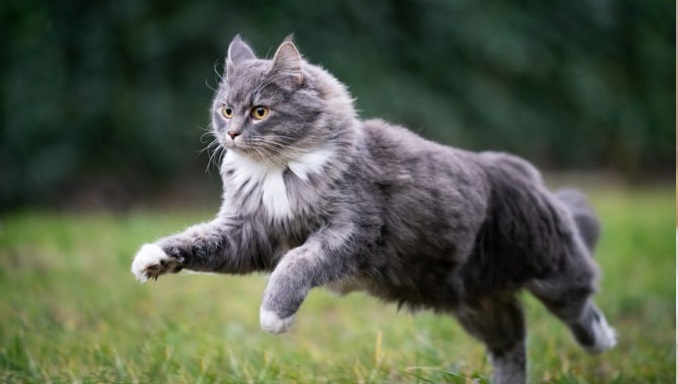
FAQs about Are Maine Coon Cats Hypoallergenic
Is Maine Coon good for beginners?
Maine Coons are good for beginners because they are intelligent, social, and affectionate cats. They enjoy being around people and other animals, making them ideal companions for first-time cat owners. Maine Coons are also relatively easy to care for, requiring minimal grooming and feeding. With proper care, Maine Coons can live long, healthy lives. If you’re looking for a loving, loyal companion, a Maine Coon is a great choice.
Can Maine Coons be left alone?
Maine Coons are not known for being particularly independent, so it’s generally not a good idea to leave them alone for extended periods of time. If you must be away from home for more than a few hours, it’s best to have someone check in on your Maine Coon regularly, or better yet, bring them with you. Maine Coons are social creatures and do best when they have company, so being left alone can be stressful for them.
Do Maine Coons use a litter box?
Yes, Maine Coons use a litter box just like any other domesticated cat. It is important to keep the litter box clean and accessible at all times to avoid accidents. Some Maine Coons may be particular about the type of litter or where the litter box is located, so it is important to experiment to find what works best for your individual cat.
Can Maine Coon cats be indoor cats?
Yes, Maine Coon cats can be indoor cats. In fact, they tend to do very well as indoor cats and can live happily indoors with proper care. Of course, like all cats, they need plenty of exercise and playtime, so make sure to provide them with plenty of toys and a scratching post. They also need a good diet and regular vet care. But overall, Maine Coons make great indoor cats.
What is so special about Maine Coon cats?
There are several things that make Maine Coon cats special. They are one of the largest domesticated cat breeds, and they are known for their gentle dispositions and affectionate nature. They are also relatively long-lived, with some Maine Coons living into their twenties. Finally, they have a distinctive appearance, with their large size and thick fur.
Is a Maine Coon cat a good pet?
Maine Coon cats are known for being social, affectionate, and playful. They are also relatively easy to train and can be great pets for families with children. Maine Coon cats typically do well with other pets, so if you already have a dog or cat, a Maine Coon may be a good addition to your home.
Why are Maine Coons so big?
There are a few reasons that Maine Coons tend to be larger than your average domestic cat. One reason is that they are a naturally occurring breed, meaning that they have not been bred for specific size or weight standards like many other domesticated animals. Additionally, Maine Coons are known for being hardy and robust cats, which may contribute to their larger size. Finally, some experts believe that Maine Coons may have trace amounts of wildcat in their DNA, which could also account for their impressive size. Whatever the reason, there’s no doubt that Maine Coons are one of the largest domesticated cat breeds around!
Do Maine Coon cats love water?
Maine Coon cats are known for their love of water. They often enjoy playing in water bowls or even taking a dip in the pool. While not all Maine Coons love water, many of them do and it is definitely one of their favorite activities.
Are there any hypoallergenic cats?
Yes, there are certain breeds of hypoallergenic cats that are less likely to cause an allergic reaction in people. These include the Siberian cat, the sphynx cat, and the Devon Rex. While no cat is completely hypoallergenic, these breeds tend to produce less of the protein that is responsible for triggering allergies in people.
Can you build up an immunity to cat allergies?
There is no known cure for allergies, and there is no way to build up an immunity to them. Allergies are a reaction by your immune system to a substance that it perceives as being foreign or dangerous. When you come into contact with the allergen, your body releases histamines and other chemicals in an attempt to protect itself, which can lead to the symptoms of an allergic reaction. Some people may be able to reduce their symptoms by avoiding contact with the allergen, but it is not possible to completely eliminate the allergy.
Which cats are the worst for allergies?
There is no definitive answer to this question as everyone’s allergies are different. However, some cats that are known to be particularly prone to triggering allergies include Russian Blues, Persians, and Siamese. These breeds tend to produce more of the protein that causes allergies, so they are not the good choice for people with severe reactions. That said, there are plenty of people with allergies who live happily with these breeds of cats, so it’s really a matter of finding the right fit for you and your family. Other hypoallergenic breeds that may be worth considering include Devon Rexes and Sphynxes.
Conclusion
While Maine Coon cats may not be hypoallergenic for everyone, they are a great option for those looking for a non-traditional cat. These cats have a lot of personality and have been known to be very affectionate with their owners. If you’re thinking about adding a Maine Coon cat to your family, do your research and make sure you’re prepared for the added responsibility that comes with owning one of these big kitties!
Above is the article “Are Maine Coon cats hypoallergenic?”, Thanks for reading!








